How to Report Corruption in India?
- Sections
- What are the types of Corruption?
- How to report corruption in India?
- How to report corruption against a Central government employee?
- How to report a complaint on the Central Vigilance Commission website?
- How can I report corruption anonymously?
- How to report corruption through CBI?
- How to report corruption through Lokpal?
- "Conclusion
- FAQs
What is Corruption? The misuse of entrusted power for personal benefits. Corruption inevitably destroys trust, weakens democracy, and slows down the economy. The limitless corruption would even cause the downfall of the Government. It can happen in every sector of society.
What are the types of Corruption?
Corruption can be defined and categorised into different types like petty corruption, grand corruption, and systematic corruption.
Corruption can occur to a massive extent that even affects the authority. Exposing corruption and penalising the corrupt is the only solution for reducing this.
The fight against won't be a win without the help of citizen support and active surveillance of the authority.
How to report corruption in India?
The Indian judiciary has strong laws against corruption. The fact is there is no need for a lawyer to file a complaint.
In India, you can report corruption through government-initiated agencies like
-
Central Vigilance Commission(CVC)
-
Central Bureau of Investigation(CBI)
-
Lokpal
How to report corruption against a Central government employee?
To report corruption against Central Government employees, you should reach out to Central Vigilance Commission (CVC).
The Commission is empowered to inquire or cause inquiries to be conducted into offences alleged to have been committed by certain categories of public servants of the Central Government.
Categories of such public servants are as below:
a) Members of All-India Services serving in connection with the affairs of the Union and Group A officers of the Central Government
b) Officers of the rank of Scale V and above in the Public Sector Banks
c) Chief Executives and Executives on the Board and other officers of E-8 and above in Schedule ‘A’ and ‘B’ Public Sector Undertakings
d) Chief Executives and Executives on the Board and other officers of E-7 and above in Schedule ‘C’ and ‘D’ Public Sector Undertakings
e) Officers in Grade D and above in Reserve Bank of India, NABARD and SIDBI
f) Managers and above in General Insurance Companies
g) Senior Divisional Managers and above in Life Insurance Corporations
h) Officers drawing a salary of Rs.8700/- p.m. and above on Central Government D.A. pattern, as on the date of the notification (dt.12th September 2007) and as may be revised from time to time in Societies and other Local Authorities
How to report a complaint on the Central Vigilance Commission website?
The commission only accepts the signed complaints, which means they will not undertake anonymous complaints. For the security of the informer, the identity of the informer can be kept a secret.
Complaints can be lodged by addressing a written letter to the Commission or through the official portal.
Lodging complaints through the CVC portal
Follow the below steps to file a complaint against corrupt officials through the official portal of the Central Vigilance Commission.
-
Click on “Lodge A Complaint”
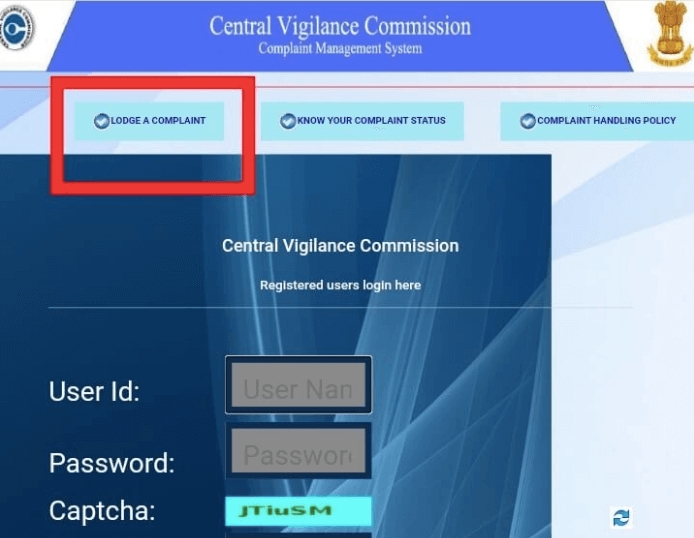
- Select the “Complaint Category”
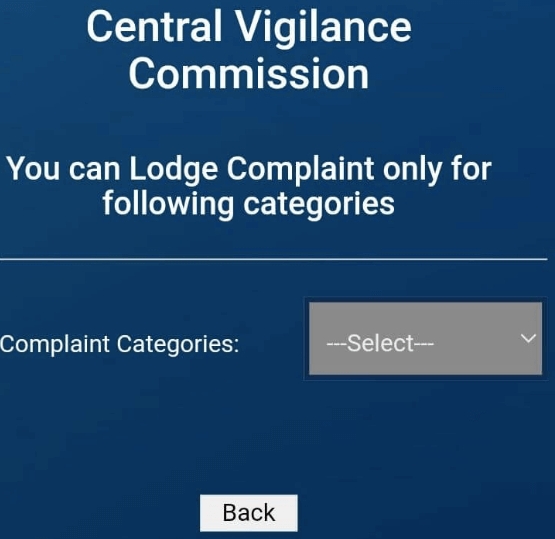
- If you are a new user, register the site with ID Proof and address
How to track complaint status on the CVC portal?
Once the commission directs the vigilance officer to investigate and report on a complaint, a complaint number would be provided to the complainant.
Follow the below steps to know your complaint status through the official portal of the Central Vigilance Commission.
-
Click on “Know your Complaint Status”
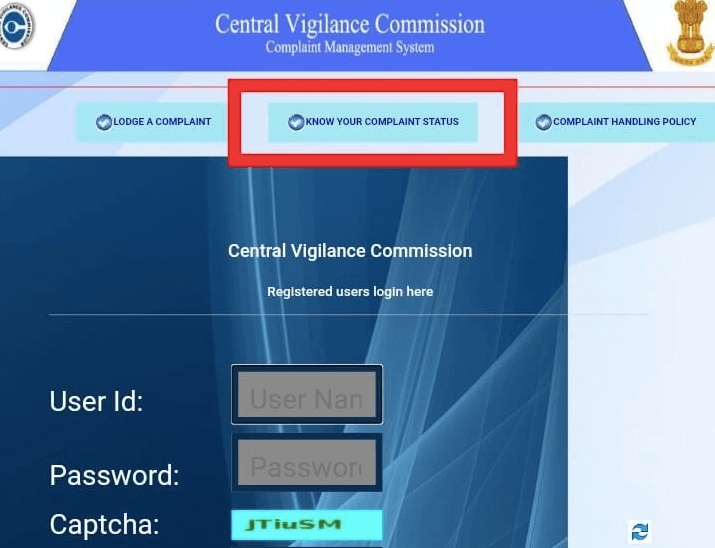
-
Type complaint number provided on “Search Complaint”
-
Click on “Search”
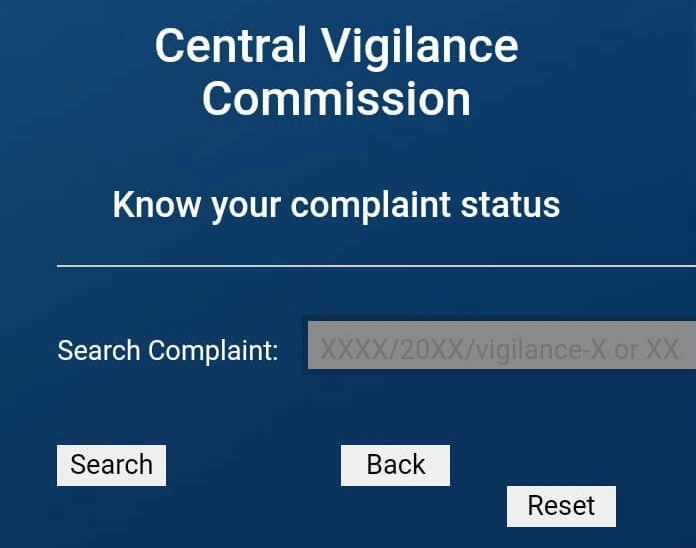
NB: Complaints sent on any e-mail ID of officers of the commission will not be entertained or taken cognizance of by the commission.
For taking mandatory action against complaints about the unethical behaviour of public servants, it is salient to submit the complaint to the authority after taking care of certain aspects.
Guidelines for the Complainant to Central Vigilance Commission
-
The complaint should be about Ministries/ Departments/ Organisations falling within the jurisdiction of the commission.
-
Complaints sent through written communication/letter should contain the name and personal details, complete postal address (mobile/telephone number, if any) of the sender with specific details/information of the matter. The complaint is signed by the complainant.
-
Complaints lodged with the commission should be genuine and not malicious, vexatious, or frivolous and should be based on verifiable facts.
-
A complaint should preferably be lodged in typed or written form in English or Hindi language for facilitating early action thereon.
-
The complaint should not be anonymous or pseudonymous.
-
Complaints should be specific with adequate evidence. The complaint should not be biassed or based on any personal grievances.
-
Complaints sent on any email ID of officers of the commission will not be entertained or taken cognizance of by the commission.
-
The complainant should address the complaint directly to the commission.
-
Normally one specific issue should be raised in one complaint. However, if more than one specific issue is there, it is better to raise the same in a separate complaint. Further, complainants, while forwarding their complaints to the commission, should mention details one by one in a coherent manner so that the same can be understood unambiguously.
-
All types of complaints, even if printed or photocopied, should be legible.
-
The complainants should lodge complaints only regarding issues having a vigilance angle and which are not part of any litigation in any courts, tribunals, etc., i.e. the matter should not be sub-judice.
-
Complainants who want to keep their identity confidential should file a complaint under the provisions of PIDPI resolution. The complainants who want to make a whistleblower complaint under PIDPI Resolution should familiarise themselves with the proper procedure of PIDPI Resolution.
-
In the matter of complaint-related tenders, while the commission may get the matter investigated, it would not generally interfere in the tendering process.
How can I report corruption anonymously?
If a complainant while exposing a case of corruption wants his identity to be kept secret, he/she should complain Public Interest Disclosure and Protection of Informers Resolution (PIDPIR) – popularly known as Whistle Blower Provision. Commission is mandated not only to maintain the secrecy of the complainant’s identity but also provide protection to the complainant against any physical threat, harassment or victimization. The procedure of lodging complaints under PIDPIR
1. Complaint under “Public Interest Disclosure and Protection of Informer” Resolution can be made only by post. The envelope should be superscribed “PIDPI” or “Whistle Blower”. The complainant should refrain from giving his name on the body of the letter. The personal detail should be separately given or given at the top or end of the letter so that they can be easily blocked out.
2. If any person is victimised because he had filed a complaint under the Whistle Blower Provisions, he may apply to the commission seeking redressal in the matter. Commission would then intervene suitably to protect the complainant.
3. The complainant can use the complaint number provided by the Commission to see the status of action on complaints that have been forwarded to the authorities concerned for investigation and report by clicking on the ‘Complaint Status’ displayed on the commission’s website.
How to report corruption through CBI?
Every state in India has at least one CBI office. The people can register the signed complaint through the post, in person or online
Follow the below steps to complain about corruption through the CBI.
-
Visit CBI Official Portal
-
Scroll down to the bottom of the home page, click on “Join us” on the “Fighting Corruption” field

- Select the branch nearest to you for informing of the corruption.
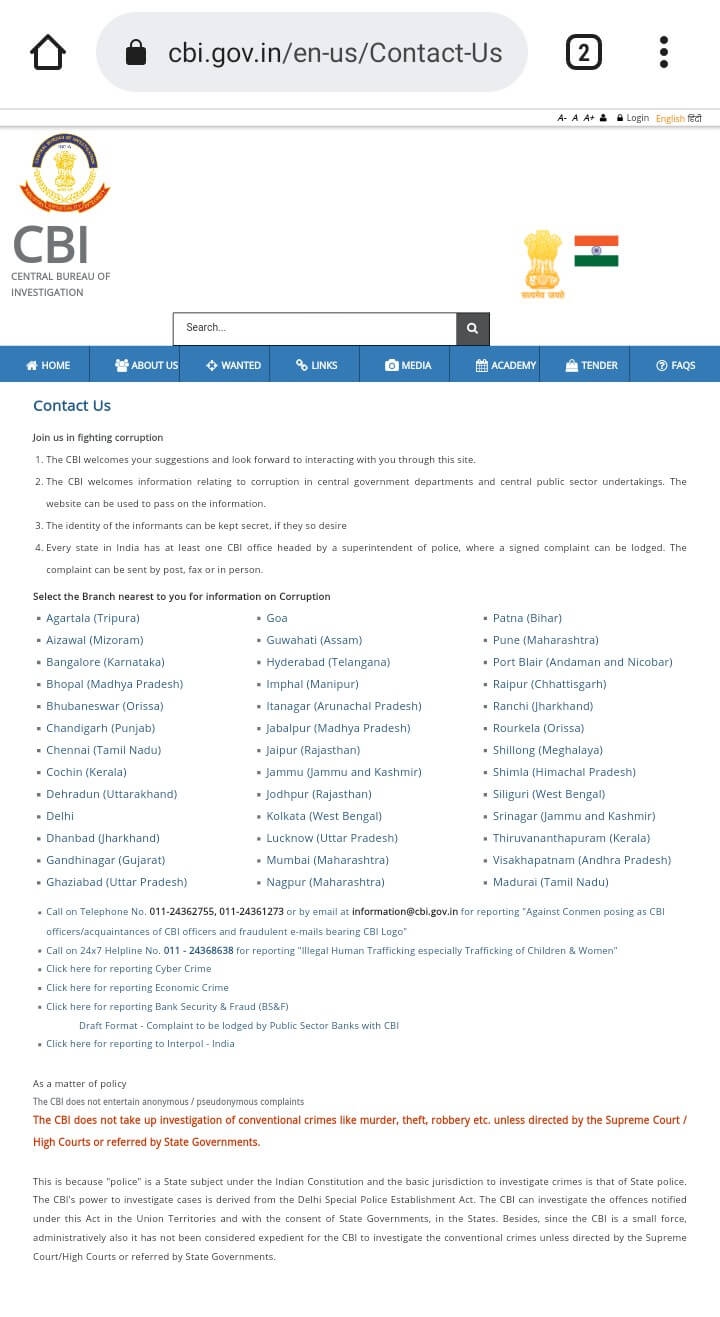
- You will get the contact information
How to report corruption through Lokpal?
Lokpal is a remarkable authority by the Indian government to prevent corruption. Lokpal means “defender of people” or “people’s friend” board of ombudsmen consists of a chairperson and eight members.
The Lokpal is liable for examining corruption at the national level.
Visit How to complain Lokpal for more details
"Conclusion
In brief, corruption not only lowers the trust of the public in authorities but also affects the economy. A corruption-free country where all individuals have equal access to perks of development is the dream of everyone who believes in democracy.
“Fight corruption if you want a better Society”
FAQs
You can find a list of common Corruption queries and their answer in the link below.
Corruption queries and its answers
Tesz is a free-to-use platform for citizens to ask government-related queries. Questions are sent to a community of experts, departments and citizens to answer. You can ask the queries here.
Ask Question
 Share
Share




